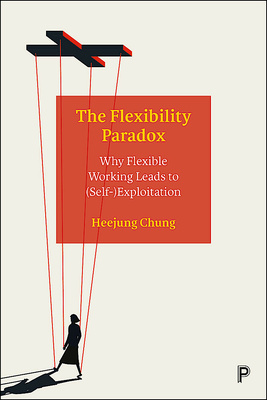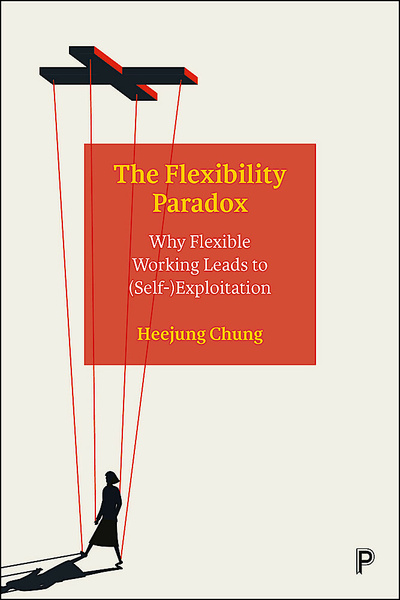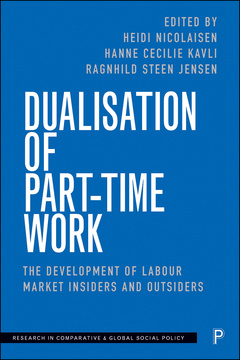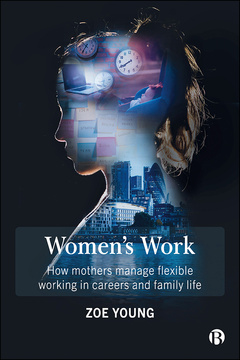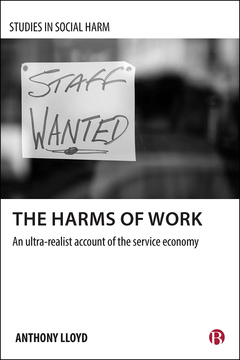Published
Sep 1, 2022Page count
270 pagesISBN
978-1447354789Dimensions
234 x 156 mmImprint
Policy PressPublished
Mar 4, 2022Page count
270 pagesISBN
978-1447354772Dimensions
234 x 156 mmImprint
Policy PressPublished
Mar 4, 2022Page count
270 pagesISBN
978-1447354819Imprint
Policy PressPublished
Mar 4, 2022Page count
270 pagesISBN
978-1447354819Imprint
Policy PressIn the media
Flexible working is not always a good idea, says this sociologist Vrij Nederland
Flexible schedules lead to more work and cut free time on La Vanguardia
'Why flexible working can lead to exploitation, especially for women' on the Big Careers, Small Children podcast
''Flexible Hours' Often Mean More Work—Especially for Women' in WIRED
'Why Flexible Work Hours May Mean More Work for Women' in The Swaddle
'Flexible working can lead people to work longer and harder, according to new book' in Workplace Insight
'FLEXIBLE WORK: How not to exploit ourselves' episode of the The Solo Collective podcast
'POLICY BRIEFING: Recommendations for flexible working' on Transforming Society
'The flexibility paradox' on workingmums.co.uk
'Covid and change' on BBC Radio 4
'Flexible work creates another stigma if it becomes 'only mothers' system' in Hankyoreh (Korean)
'The Flexibility Paradox' on New Books Network Critical Theory
Being busy has become a status symbol DeMorgen
Working 120 hours a week? What Elon Musk is saying is just nonsense DeMorgen
Does flexible working really provide a better work-life balance?
Throughout the COVID-19 pandemic, flexible working has become the norm for many workers. This volume offers an original examination of flexible working using data from 30 European countries and drawing on studies conducted in Australia, the US and India. Rather than providing a better work-life balance, the book reveals how flexible working can lead to exploitation, which manifests differently for women and men, such as more care responsibilities or increased working hours.
Taking a critical stance, this book investigates the potential risks and benefits of flexible working and provides crucial policy recommendations for overcoming the negative consequences.
"... In addition to its scholarly qualities, The Flexibility Paradox is of great value to society at large because of the social project it represents." Etnofoor
"... three decades after the publications of The Second Shift (1989) by Hochschild and The Overworked American (1992) by Schor, Chung’s book provides a necessary update on the state of work and leisure, particularly in light of the social changes wrought by the global pandemic." Social Forces
"…a welcome and timely contribution to the disciplines of sociology, social policy, and management studies. Readers interested in gender inequalities in the interface between work and family life would find this book interesting and informative… an excellent primer for anyone researching or studying flexible working." Gender, Work and Organization
"Flexible work is a priority for many workers and yet remains a puzzle to many employers. This book provides much-needed clarity about the critical role schedule control will play in creating equitable work systems and cultures." Brigid Schulte, New America
“Be careful what you wish for with regard to flexible work. Chung’s savvy analysis and fresh perspective explains the reasons that flexible work so often creates more work.” Erin L. Kelly, Massachusetts Institute of Technology
"This is a well-written and well-researched study which should be required reading for anyone interested in how our society is changing and in the interaction between gender norms and the market system in moulding the world in which we live." Peter Taylor-Gooby, University of Kent
“This book exposes the unintended consequences of workplace innovations, and the ways apparently progressive ideas can be captured to serve other purposes. Chung shows that we need to be more thoughtful about how we implement flexible work policies, and more attentive to the ways they actually play out in workplaces and lives. She warns us away from seeing flexibility as a solution that lets employers avoid harder structural changes and policy reforms.” Alex Soojung-Kim Pang, author of REST and SHORTER and Programme Director, 4 day week Global
"Heejung Chung uses an immense amount of analyses with reasoned theory to illustrate how flexible work can amplify broader social problems despite its potential to help workers. This is a comprehensive must-read for anyone interested in flexible work." Richard Petts, Ball State University
Heejung Chung is Professor of Work and Employment in King's Business School at King's College London.
Introduction: The flexibility paradox and contexts
The demand for and trends in flexible working
The dual nature of flexibility: Family-friendly or performance-oriented logic?
The outcomes of flexible working
The flexibility paradox: Why more freedom at work leads to more work
The empirical evidence of the flexibility paradox
Gendered flexibility paradox
Flexibility stigma and the rewards of flexible working
The importance of contexts
COVID- 19 and flexible working
Conclusion: Where do we go from here?







